24 start with O start with O

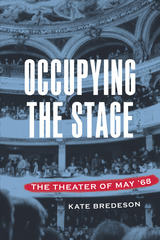
The book shows how French theater artists during this period used a strategy of occupation-occupying buildings, streets, language, words, traditions, and artistic processes-as their central tactic of protest and transformation. It further proposes that the Theater of May '68 has left imprints on contemporary artists and activists, and that this theater offers a scaffolding on which to build a meaningful analysis of contemporary protest and performance in France, North America, and beyond.
At the book's heart is an inquiry into how artists of the period used theater as a way to engage in political work and, concurrently, questioned and overhauled traditional theater practices so their art would better reflect the way they wanted the world to be. Occupying the Stage embraces the utopic vision of May '68 while probing the period's many contradictions. It thus affirms the vital role theater can play in the ongoing work of social change.

Off-Screen Cinema is the first monograph in English of the Lettrists. Offering a full portrait of the avant-garde scene of 1950s Paris, it focuses on the film works of key Lettrist figures like Gil J Wolman, Maurice Lemaître, François Dufrêne, and especially the movement's founder, Isidore Isou, a Romanian immigrant whose “discrepant editing” deliberately uncoupled image and sound. Through Cabañas's history, we see not only the full scope of the Lettrist project, but also its clear influence on Situationism, the French New Wave, the New Realists, as well as American filmmakers such as Stan Brakhage.

After the defeat and exile of Napoleon and the restoration of the Bourbons, the political climate of France was one of seething unrest, intrigue, and dissent. A clandestine and conspiratorial movement known as the Carbonari, or Charbonnerie, arose in the early 1820's with the aim of overthrowing the monarchy of Louis XVIII. Modeling itself after the Italian Carbonari, this coalition of young French republicans--bonapartists, retired army officers, junior and non-commissioned officers, and leaders of the extreme liberal wing of the Chamber of Deputies--set up cells throughout France, hoping in particular to infiltrate vulnerable army units. Old Hatreds and Young Hopes follows the movement from its beginnings to its ultimate failure, from plots to trials.
Sources of information about secret societies and political conspiracies are always scattered and complex, and often unreliable. Spitzer demonstrates that the secrets of a conspiracy and its place in the broader history of a nation can nevertheless be brought to light by evaluating one kind of evidence against another, by checking and testing government sources, particularly police documents, against such other materials as the memoirs and letters of conspirators and contemporary journalistic accounts. His book is much more than the story of the conspirators. In showing why the conspiracy developed and how it was handled, the author has illuminated the workings of the politicalsystem of the Restoration--the structure and organization of its administration and political police and the operation of political justice in its courts. He also situates the French Carbonari in the history of secret societies and radical movements in the first half of the nineteenth century and works out links with similar groups in other countries.
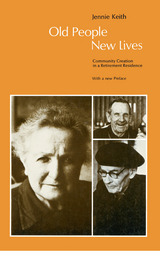

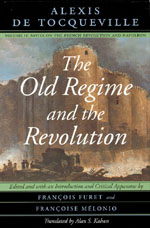
Tocqueville died in the midst of this work. Here in volume 2—in clear, up-to-date English—is all that he had completed, including the chapters he started for a work on Napoleon, notes and analyses he made in the course of researching and writing the first volume, and his notes on his preparation for his continuation. Based on the new French edition of The Old Regime, most of the translated texts have never before appeared in English, and many of those that have appeared have been considerable altered. More than ever before, readers will be able to see how Tocqueville's account of the Revolution would have come out, had he lived to finish it. This handsomely produced volume completes the set and is essential reading for anyone interested in the French Revolution or in Tocqueville's thought.
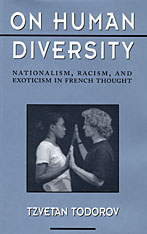
How can we think about peoples and cultures unlike our own? In the early modern period, the fact of human diversity presented Europeans with little cause for anxiety: they simply assumed the superiority of the West. During the eighteenth century this view was gradually abandoned, as thinkers argued that other peoples possessed reason and sensibility, and thus deserved the same respect that Westerners accorded themselves. Since that time, however, Enlightenment belief in the universals of human nature has fallen into disrepute; critics allege that such notions have had disastrous consequences in the twentieth century, ranging from prejudice to persecution and outright genocide.
Tzvetan Todorov, an internationally admired scholar, aims in this book to salvage the good name of the Enlightenment so that its ideas can once more inspire humane thought and action. The question he poses is of urgent relevance to the conflicts of our age: How can we avoid the dangers of a perverted universalism and scientism, as well as the pitfalls of relativism? Since the French were the ideologues of universalism and played a preeminent role in the diffusion of Enlightenment ideas in Europe, Todorov focuses on the French intellectual tradition, analyzing writers ranging from Montaigne through Tocqueville, Michelet, and Renan, to Lévi-Strauss. He shows how theories of human diversity were developed in the eighteenth century, and later systematically distorted. The virtues of Enlightenment thought became vices in the hands of nineteenth-century thinkers, as a result of racism, nationalism, and the search for exoticism. Todorov calls for us to reject this legacy and to strive once again for an acceptance of human diversity, through a "critical humanism" prefigured in the writings of Rousseau and Montesquieu.
This is a work of impressive erudition and insight--a masterly synthesis that can help us think incisively about the racial and ethnic tensions confronting the world today.

In On Hysteria, Sabine Arnaud traces the creation and rise of hysteria, from its invention in the eighteenth century through nineteenth-century therapeutic practice. Hysteria took shape, she shows, as a predominantly aristocratic malady, only beginning to cross class boundaries (and be limited to women) during the French Revolution. Unlike most studies of the role and status of medicine and its categories in this period, On Hysteria focuses not on institutions but on narrative strategies and writing—the ways that texts in a wide range of genres helped to build knowledge through misinterpretation and recontextualized citation.
Powerfully interdisciplinary, and offering access to rare historical material for the first time in English, On Hysteria will speak to scholars in a wide range of fields, including the history of science, French studies, and comparative literature.

On Monique Wittig contains twelve essays, representing French, Francophone, and U.S. critics, including three previously unpublished pieces by Wittig herself. Among the essays is Diane Griffin Crowder's discussion of the U.S. feminist movement, Linda Zerilli's consideration of gender and will, and Teresa de Lauretis's examination of the development of lesbian theory. Together, these essays situate Wittig's work in terms of the cultural contexts of its production and reception. This volume also contains the first authenticated chronology of Wittig's life and features the first translation of "For a Movement of Women's Liberation," which Wittig published with other "militantes" in May 1970.
As the first book to appear on Wittig following her death, On Monique Wittig is an indispensable tool for feminist scholars.

In this volume, the extraordinary nature and extent of Robert Antelme's accomplishment, and of the reverberations he set in motion in French life and literature, finds eloquent expression. The pieces Antelme wrote for journals—including essays on "principles put to the test," man as the "basis of right," and the question of revenge—appear here alongside appreciations of The Human Race by authors from Perec to Maurice Blanchot to Sarah Kofman. Also included are Antelme's personal recollections and interviews with, among others, Dionys Mascolo (who brought Antelme back from Dachau), Marguerite Duras (Antelme's wife, who tells of his return from Germany), and Mitterand.
Also available: Antelme's The Human Race

In 1754, Charles de Raymond, chevalier of the Royal and Military Order of Saint Louis and a captain in the Troupes de la Marine wrote a bold, candid, and revealing expose; on the French colonial posts and settlements of New France. On the Eve of the Conquest, more than an annotated translation, includes a discussion on the historical background of the start of the French and Indian War, as well as a concise biography of Raymond and Michel Le Courtois de Surlaville, the army colonel at the French court to whom the report was sent. The events surrounding Raymond's controversial year as commandant of the post (now Fort Wayne, Indiana) in 1749-50, his disputed recall by Governor General Jacques-Pierre de Taffanel de La Jonquier, and the subsequent friction between La Jonquiere's successor, Ange de Menneville Duqesne, and Raymond are presented in detail and illustrated by translations of their correspondence.
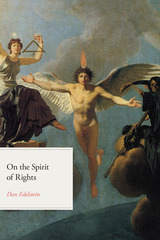
In On the Spirit of Rights, Dan Edelstein answers this question by examining the complex genealogy of the rights that regimes enshrined in the American and French Revolutions. With a lively attention to detail, he surveys a sprawling series of debates among rulers, jurists, philosophers, political reformers, writers, and others who were all engaged in laying the groundwork for our contemporary systems of constitutional governance. Every seemingly new claim about rights turns out to be a variation on a theme, as late medieval notions were subtly repeated and refined to yield the talk of “rights” we recognize today. From the Wars of Religion to the French Declaration of the Rights of Man and of the Citizen to the 1948 Universal Declaration of Human Rights, On the Spirit of Rights is a sweeping tour through centuries of European intellectual history and an essential guide to our ways of thinking about human rights today.

eTextbooks are now available through VitalSource.com!
On tourne! is a one-semester, advanced French textbook (5th/6th semester of instruction) designed to be used as a stand-alone text for a course on French and francophone films or for a French conversation course. This textbook could also be used as a supplementary text in an advanced conversation course, a composition course, or a contemporary culture course. On tourne! guides students to analyze and discuss thirteen films from France and the francophone world. Each chapter focuses on a single film and includes pre-viewing activities, vocabulary, information on the cultural and linguistic nuances of the film, and post-viewing activities and discussion points. Moreover, each chapter contains a review of an essential grammatical structure as well as idiomatic expressions used in the film to highlight their pragmatic function. The films included explore a wide array of themes, ranging from family, food, and fashion to politics, religion, and racial/ethnic identities.

Through compelling personal accounts and family correspondence, One Step Ahead documents Alfred Feldman’s harrowing flight into exile as he and his family fled the pogroms that flooded across Nazi-occupied Europe. It is a memoir of horror and hope recounted by a man who survived the organized terror of Hitler’s "Final Solution" as it destroyed entire generations of European Jewish life within ten catastrophic years in the mid-twentieth century. Feldman’s memoir conveys the searing pain that has never left him, while demonstrating the triumphant humanity of a survivor.
Feldman vividly describes the impact of the escalating anti-Semitic hatred and violence in Germany during the 1930s, the impact of the notorious Nuremberg Laws in 1935, and the terrifying Kristallnacht pogrom in 1938. By age sixteen, Feldman was living with his parents and three younger sisters in Antwerp, Belgium, during the 1939 German invasions of Poland, marking the start of World War II. In the face of increasing persecution, Feldman’s extended family scattered over the globe in a desperate attempt to remain one step ahead of their Nazi pursuers.
Recalling his life on the run, Feldman describes what few survivors have chosen to write about: the Vichy raids of August 26, 1942; the French labor brigades; the Comité Dubouchage; and life in super-vised residence in France under the Italians. While in the south of France, Feldman endured food shortages and Nazi anti-Semitic measures, beginning with work camps and culminating in the deportation and ultimate death of his mother and sisters at Auschwitz.
To evade the Germans, Feldman and his father fled into the Italian Alps in September of 1943, hiding between the Allies and the Germans. Aided by local villagers, the Feldmans survived precariously for over a year and a half, along with other Jewish refugees, until that region was liberated. Only then, and only gradually, did Feldman manage to piece together the fate of his surviving family and learn at last of the death of his mother and sisters.
Now, as an adult, Alfred Feldman has retraced his escape and exile, taking his wife and children to his hometown in Germany, the mountains in Italy, and Montagnac, where a plaque commemorates his mother and sisters.
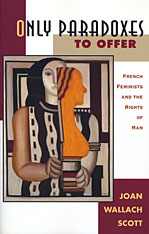
When feminists argued for political rights in the context of liberal democracy they faced an impossible choice. On the one hand, they insisted that the differences between men and women were irrelevant for citizenship. On the other hand, by the fact that they acted on behalf of women, they introduced the very idea of difference they sought to eliminate. This paradox--the need both to accept and to refuse sexual difference in politics--was the constitutive condition of the long struggle by women to gain the right of citizenship. In this new book, remarkable in both its findings and its methodology, award-winning historian Joan Wallach Scott reads feminist history in terms of this paradox of sexual difference.
Focusing on four French feminist activists--Olympe de Gouges, who wrote the Declaration of the Rights of Woman and Citizen during the French Revolution; Jeanne Deroin, a utopian socialist and candidate for legislative office in 1848; Hubertine Auclert, the suffragist of the Third Republic; and Madeleine Pelletier, a psychiatrist in the early twentieth century who argued that women must "virilize" themselves in order to gain equality--Scott charts the repetitions and variations in feminist history. Again and again, feminists tried to prove they were individuals, according to the standards of individuality of their day. Again and again, they confronted the assumption that individuals were men. But when sexual difference was taken to be a fundamental difference, when only men were regarded as individuals and thus as citizens, how could women also be citizens? The imaginative and courageous answers feminists offered to these questions are the subject of this engaging book.
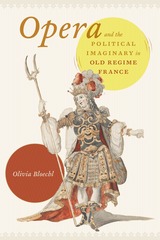
In Opera and the Political Imaginary in Old Regime France, however, Olivia Bloechl reveals another layer of French opera’s political theater. The make-believe worlds on stage, she shows, involved not just fantasies of sovereign rule but also aspects of government. Plot conflicts over public conduct, morality, security, and law thus appear side-by-side with tableaus hailing glorious majesty. What’s more, opera’s creators dispersed sovereign-like dignity and powers well beyond the genre’s larger-than-life rulers and gods, to its lovers, magicians, and artists. This speaks to the genre’s distinctive combination of a theological political vocabulary with a concern for mundane human capacities, which is explored here for the first time.
By looking at the political relations among opera characters and choruses in recurring scenes of mourning, confession, punishment, and pardoning, we can glimpse a collective political experience underlying, and sometimes working against, ancienrégime absolutism. Through this lens, French opera of the period emerges as a deeply conservative, yet also more politically nuanced, genre than previously thought.
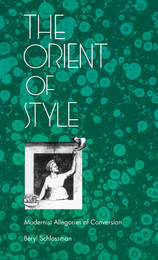
Toward the end of Remembrance of Things Past, the narrator describes the act of creating a work of art as a conversion of sensation into a spiritual equivalent. By means of such allegories of “conversion,” Schlossman shows, the modernist artist disappeared within the work of art and left behind the trace of his sublime vocation, a vocation in which he was transformed, in Schlossman’s words, “into a kind of priest kneeling at the altar of beauty before the masked divinity of representation.”
The author shows how allegory—the representation of the symbolic as something real—was adapted by modernist writers to reflect subjectivity while masking an authorial origin. She reveals how modernist allegory arose, as Walter Benjamin suggests, at the crossroads of history, sociology, economics, urban architecture, and art—providing a kind of map of capitalism—and was produced through the eyes of a melancholic gazing at a “monument of absence.”
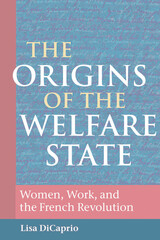
Women workers and the revolutionary origins of the modern welfare state
In May 1790, the French National Assembly created spinning workshops (ateliers de filature) for thousands of unemployed women in Paris. These ateliers disclose new aspects of the process which transformed Old Regime charity into revolutionary welfare initiatives characterized by secularization, centralization, and entitlements based on citizenship. This study is the first to examine women and the welfare state in its formative period at a time when modern concepts of human rights were elaborated.
In The Origins of the Welfare State, Lisa DiCaprio reveals how the women working in the ateliers, municipal welfare officials, and the national government vied to define the meaning of revolutionary welfare throughout the Revolution. Presenting demands for improved wages and working conditions to a wide array of revolutionary officials, the women workers exercised their rights as "passive citizens" capaciously and shaped the meanings of work, welfare, and citizenship. Looking backward to the Old Regime and forward to the nineteenth century, this study explores the interventionist spirit that characterized liberalism in the eighteenth century and serves as a bridge to the history of entitlements in the nineteenth and twentieth centuries.

On July 10, 1940, by a 570 to 80 margin, the representatives in the French parliament voted full powers to Philippe Pétain, ending the Third Republic and paving the way for the collaborationist Vichy regime. Olivier Wieviorka offers a nuanced portrait of the individuals who determined the fate of France at this critical moment.
Pétain claimed to be saving France from ruin. The day of the vote has been described as a journée des dupes, the legislators so ignorant or fearful that they voted without a thought to the consequences. But Wieviorka shows that most of the deputies made a considered decision to vote for Pétain. He analyzes the factors, such as political culture and regional origins, that motivated the voting on both sides, and traces the men’s fates through the war.
Recreating the tense atmosphere of summer 1940, Wieviorka shows how pressures brought on by defeat could affect even the most hardened republicans. He illuminates the complex moral issues inherent in accommodation and collaboration in a time of crisis.
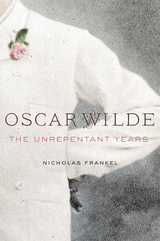
Nicholas Frankel presents a new and revisionary account of Wilde’s final years, spent in poverty and exile on the European continent following his release from an English prison for the crime of “gross indecency” between men. Oscar Wilde: The Unrepentant Years challenges the prevailing, traditional view of Wilde as a broken, tragic figure, a martyr to Victorian sexual morality, and shows instead that he pursued his post-prison life with passion, enjoying new liberties while trying to resurrect his literary career.
After two bitter years of solitary confinement, Frankel shows, Wilde emerged from prison in 1897 determined to rebuild his life along lines that were continuous with the path he had followed before his conviction, unapologetic and even defiant about the crime for which he had been convicted. England had already done its worst. In Europe’s more tolerant atmosphere, he could begin to live openly and without hypocrisy.
Frankel overturns previous misunderstandings of Wilde’s relationship with Lord Alfred Douglas, the great love of his life, with whom he hoped to live permanently in Naples, following their secret and ill-fated elopement there. He describes how and why the two men were forced apart, as well as Wilde’s subsequent relations with a series of young men. Oscar Wilde pays close attention to Wilde’s final two important works, De Profundis and The Ballad of Reading Gaol, while detailing his nearly three-year residence in Paris. There, despite repeated setbacks and open hostility, Wilde attempted to rebuild himself as a man—and a man of letters.
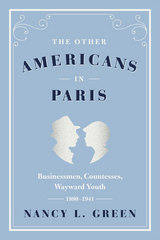
Nancy L. Green thus introduces us for the first time to a long-forgotten part of the American overseas population—predecessors to today’s expats—while exploring the politics of citizenship and the business relationships, love lives, and wealth (and poverty for some) of Americans who staked their claim to the City of Light. The Other Americans in Paris shows that elite migration is a part of migration tout court and that debates over “Americanization” have deep roots in the twentieth century.
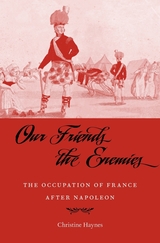
The Napoleonic wars did not end with Waterloo. That famous battle was just the beginning of a long, complex transition to peace. After a massive invasion of France by more than a million soldiers from across Europe, the Allied powers insisted on a long-term occupation of the country to guarantee that the defeated nation rebuild itself and pay substantial reparations to its conquerors. Our Friends the Enemies provides the first comprehensive history of the post-Napoleonic occupation of France and its innovative approach to peacemaking.
From 1815 to 1818, a multinational force of 150,000 men under the command of the Duke of Wellington occupied northeastern France. From military, political, and cultural perspectives, Christine Haynes reconstructs the experience of the occupiers and the occupied in Paris and across the French countryside. The occupation involved some violence, but it also promoted considerable exchange and reconciliation between the French and their former enemies.
By forcing the restored monarchy to undertake reforms to meet its financial obligations, this early peacekeeping operation played a pivotal role in the economic and political reconstruction of France after twenty-five years of revolution and war. Transforming former European enemies into allies, the mission established Paris as a cosmopolitan capital and foreshadowed efforts at postwar reconstruction in the twentieth century.
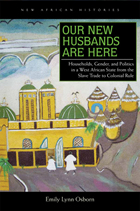
In Our New Husbands Are Here, Emily Lynn Osborn investigates a central puzzle of power and politics in West African history: Why do women figure frequently in the political narratives of the precolonial period, and then vanish altogether with colonization? Osborn addresses this question by exploring the relationship of the household to the state. By analyzing the history of statecraft in the interior savannas of West Africa (in present-day Guinea-Conakry), Osborn shows that the household, and women within it, played a critical role in the pacifist Islamic state of Kankan-Baté, enabling it to endure the predations of the transatlantic slave trade and become a major trading center in the nineteenth century. But French colonization introduced a radical new method of statecraft to the region, one that separated the household from the state and depoliticized women’s domestic roles. This book will be of interest to scholars of politics, gender, the household, slavery, and Islam in African history.
READERS
Browse our collection.
PUBLISHERS
See BiblioVault's publisher services.
STUDENT SERVICES
Files for college accessibility offices.
UChicago Accessibility Resources
home | accessibility | search | about | contact us
BiblioVault ® 2001 - 2024
The University of Chicago Press









